-
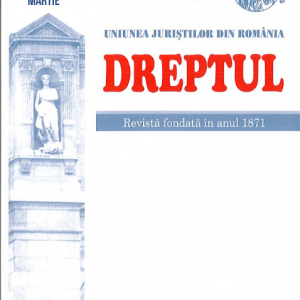 In this study the author analyzes, on the one hand, the scope of application of the provisions of the Government Emergency Ordinance No 34/2014, and, on the other hand, the consumer rights in contracts concluded with professionals which fall within the scope of application of the mentioned Ordinance. We note that the Government Emergency Ordinance No 34/2014 on the consumer rights within contracts concluded with professionals transposes, into the Romanian legislation, the provisions of Directive 2011/83/EU of the European Parliament and of the Council, published in the Official Journal of the European Union, L 304 of 22 November 2011.
In this study the author analyzes, on the one hand, the scope of application of the provisions of the Government Emergency Ordinance No 34/2014, and, on the other hand, the consumer rights in contracts concluded with professionals which fall within the scope of application of the mentioned Ordinance. We note that the Government Emergency Ordinance No 34/2014 on the consumer rights within contracts concluded with professionals transposes, into the Romanian legislation, the provisions of Directive 2011/83/EU of the European Parliament and of the Council, published in the Official Journal of the European Union, L 304 of 22 November 2011. -
 The law has, undoubtedly, the properties of a fluid. Firstly, the property to shape into the forms they come into contact: the social realities are the ones that should configure it, as François Gény once said, so that their slower or more sudden changing would automatically determine mostly imperceptible, and in some cases, convulsive changes of the legal phenomenon as well. Law is a far too important phenomenon to not be subjected to studying day by day. However, a careful analysis of law has always imposed its division, primarily for teaching, theoretical purposes, but not without having in view the practical consequences as well. Traditional or innovative, classic or revolutionary, this „slicing” into divisions, branches and legal institutions, has undergone, in its turn, plenty of changes over time, being in a state of perpetual remodeling (and remodulation). In the following lines we propose some ideas, with no greater claim than that of presenting a personal opinion, about this phenomenon of division, firstly, and of fusion, secondly, a phenomenon that repeats itself cyclically, as, ultimately, the law also contains in itself a significant dose of history.
The law has, undoubtedly, the properties of a fluid. Firstly, the property to shape into the forms they come into contact: the social realities are the ones that should configure it, as François Gény once said, so that their slower or more sudden changing would automatically determine mostly imperceptible, and in some cases, convulsive changes of the legal phenomenon as well. Law is a far too important phenomenon to not be subjected to studying day by day. However, a careful analysis of law has always imposed its division, primarily for teaching, theoretical purposes, but not without having in view the practical consequences as well. Traditional or innovative, classic or revolutionary, this „slicing” into divisions, branches and legal institutions, has undergone, in its turn, plenty of changes over time, being in a state of perpetual remodeling (and remodulation). In the following lines we propose some ideas, with no greater claim than that of presenting a personal opinion, about this phenomenon of division, firstly, and of fusion, secondly, a phenomenon that repeats itself cyclically, as, ultimately, the law also contains in itself a significant dose of history. -
 Announced in theory, present in practice, and recognized everywhere, „flexible law” is seeking its own accreditation at a doctrinal level. Covering a number of highly heterogeneous normative instruments (directives, advices, charters, codes of conduct, et al.) having as a common element the fact of being imposed not by constraint, but by the adhesion of its recipients, it manifests itself specifically in international law (as „soft law”), EU law (as a method of governance), or internal order (as a lever of achieving the functions of the state). In relation to proper law („hard law”), flexible law manifests itself either as its precursor, in the process of adoption, a companion in its enforcement, or, in certain situations, as a substitute. Knowing diverse national experiences, flexible law presents itself as a factor of simplification and improvement of the quality of legal regulations.
Announced in theory, present in practice, and recognized everywhere, „flexible law” is seeking its own accreditation at a doctrinal level. Covering a number of highly heterogeneous normative instruments (directives, advices, charters, codes of conduct, et al.) having as a common element the fact of being imposed not by constraint, but by the adhesion of its recipients, it manifests itself specifically in international law (as „soft law”), EU law (as a method of governance), or internal order (as a lever of achieving the functions of the state). In relation to proper law („hard law”), flexible law manifests itself either as its precursor, in the process of adoption, a companion in its enforcement, or, in certain situations, as a substitute. Knowing diverse national experiences, flexible law presents itself as a factor of simplification and improvement of the quality of legal regulations. -
 On 1 April 2016 there were celebrated 150 years since, by Decree of the Princely Lieutenancy, it had been approved the Regulation for establishing the Romanian Literary Society, with the special mission to determine the spelling, to elaborate the Romanian grammar and to start and develop the Romanian dictionary, thus representing „the act of birth” of the national academic institution. Transformed in 1867 into the Romanian Academic Society, it opened its area of concerns, along with literature and philology, to history and natural sciences, following that, by the Law of 1879, it would acquire legal personality and become „national institute” under the name of Romanian Academy. Over a century and a half of uninterrupted activity, the Academy was the major factor of enforcement of the Romanian spiritual unity, „the vital centre” of irradiation and promotion of the national science and culture. In this context, the law has been and still is at the same time foundation, form of culture, field of scientific knowledge, value of expression of the academic concerns, and the jurists, some of its most devoted promoters. Under the terms of transformation of the university into a setting almost exclusively for transmitting knowledge and skills of training of future professionals of law, the only forum for conducting the fundamental legal research and for the development of the science of law remains the Legal Research Institute of the Romanian Academy. In order to play such a role it must redefine its mission and re-establish its priorities, so as to provide the proper setting for the legal reflection and for the achievement of theoretical projects that should lead to the crystallization of the new Romanian doctrine of the law.
On 1 April 2016 there were celebrated 150 years since, by Decree of the Princely Lieutenancy, it had been approved the Regulation for establishing the Romanian Literary Society, with the special mission to determine the spelling, to elaborate the Romanian grammar and to start and develop the Romanian dictionary, thus representing „the act of birth” of the national academic institution. Transformed in 1867 into the Romanian Academic Society, it opened its area of concerns, along with literature and philology, to history and natural sciences, following that, by the Law of 1879, it would acquire legal personality and become „national institute” under the name of Romanian Academy. Over a century and a half of uninterrupted activity, the Academy was the major factor of enforcement of the Romanian spiritual unity, „the vital centre” of irradiation and promotion of the national science and culture. In this context, the law has been and still is at the same time foundation, form of culture, field of scientific knowledge, value of expression of the academic concerns, and the jurists, some of its most devoted promoters. Under the terms of transformation of the university into a setting almost exclusively for transmitting knowledge and skills of training of future professionals of law, the only forum for conducting the fundamental legal research and for the development of the science of law remains the Legal Research Institute of the Romanian Academy. In order to play such a role it must redefine its mission and re-establish its priorities, so as to provide the proper setting for the legal reflection and for the achievement of theoretical projects that should lead to the crystallization of the new Romanian doctrine of the law. -
 The abuse of petitions committed by the natural persons is the most common form of abuse of law as the elements necessary to qualify a right as being abusively exercised, namely the subjective element (bad faith) and the objective element (diversion of the right from the purpose, economic and social finality or overcoming the internal limits of the law) presuppose a conduct of the holder of the right related to his mental ability to understand the meaning of the deed, to discern between what is good or bad, legal and illegal. This study analyzes the forms of abuse of right committed by persons deprived of liberty both at the level of courts of law and at the level of the offices of supervisory judges, as well as the psychic attitude of the subject towards the possibility of realizing the right in contradiction with its destination and purpose, and towards the consequences that may represent damages to the person, society or state. Even if the persons deprived of liberty constitute a vulnerable category of persons, the recognition of the right of access to justice, to petition, as well as of the possibility to use them at any time, as an application of the constitutional principle of equality of all persons before the law, does not confer them also the right to exercise them excessively, in a word, to abuse of them.
The abuse of petitions committed by the natural persons is the most common form of abuse of law as the elements necessary to qualify a right as being abusively exercised, namely the subjective element (bad faith) and the objective element (diversion of the right from the purpose, economic and social finality or overcoming the internal limits of the law) presuppose a conduct of the holder of the right related to his mental ability to understand the meaning of the deed, to discern between what is good or bad, legal and illegal. This study analyzes the forms of abuse of right committed by persons deprived of liberty both at the level of courts of law and at the level of the offices of supervisory judges, as well as the psychic attitude of the subject towards the possibility of realizing the right in contradiction with its destination and purpose, and towards the consequences that may represent damages to the person, society or state. Even if the persons deprived of liberty constitute a vulnerable category of persons, the recognition of the right of access to justice, to petition, as well as of the possibility to use them at any time, as an application of the constitutional principle of equality of all persons before the law, does not confer them also the right to exercise them excessively, in a word, to abuse of them. -
 In this article, the author presents the procedure of individual complaint of the persons before the Constitutional Court of the Republic of Turkey. According to the Turkish Constitution and to the Law No 6216/2011 on establishing the procedures before the Constitutional Court, this procedure is an exceptional means of appeal which can be used after all the other legal means of appeal have been exhausted. The individual complaint before the Constitutional Court fulfils two basic functions: the protection of the fundamental rights and freedoms of the persons and the protection of the national legal order.
In this article, the author presents the procedure of individual complaint of the persons before the Constitutional Court of the Republic of Turkey. According to the Turkish Constitution and to the Law No 6216/2011 on establishing the procedures before the Constitutional Court, this procedure is an exceptional means of appeal which can be used after all the other legal means of appeal have been exhausted. The individual complaint before the Constitutional Court fulfils two basic functions: the protection of the fundamental rights and freedoms of the persons and the protection of the national legal order. -
 If, from the sociological point of view, business criminal law exists, its scope varies from one author to another, failing to determine which view is correct and which one is not. Business Criminal Law merely reflects the complexity of social relations and the difficulty to clearly separate distinct human activities. We may consider that business criminal law is addressed to professionals in the economic area and appears as a right of synthesis, regrouping common law criminal offences (theft, fraud, breach of trust, etc.), indictments in the field of economic criminal law or financial or tax criminal law and, naturally, indictments in the field of commercial criminal law.
If, from the sociological point of view, business criminal law exists, its scope varies from one author to another, failing to determine which view is correct and which one is not. Business Criminal Law merely reflects the complexity of social relations and the difficulty to clearly separate distinct human activities. We may consider that business criminal law is addressed to professionals in the economic area and appears as a right of synthesis, regrouping common law criminal offences (theft, fraud, breach of trust, etc.), indictments in the field of economic criminal law or financial or tax criminal law and, naturally, indictments in the field of commercial criminal law. -
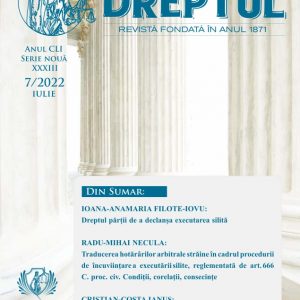 In this study, the author intends to emphasize a number of rights by which the procedural availability is manifested in the phase of enforcement, whose purpose is to carry out the provisions contained in the enforceable titles. The initiation of the second phase of the civil trial, by notifying the court executor, as well as the moment of registration of the application for enforcement are of special importance. The principle of availability is also manifested by the abandonment of the enforcement procedure, the waiver of the claimed right, as well as by the possibility of the parties to find, by mutual agreement, convenient ways of exercising rights and of executing obligations, by concluding a mediation agreement.
In this study, the author intends to emphasize a number of rights by which the procedural availability is manifested in the phase of enforcement, whose purpose is to carry out the provisions contained in the enforceable titles. The initiation of the second phase of the civil trial, by notifying the court executor, as well as the moment of registration of the application for enforcement are of special importance. The principle of availability is also manifested by the abandonment of the enforcement procedure, the waiver of the claimed right, as well as by the possibility of the parties to find, by mutual agreement, convenient ways of exercising rights and of executing obligations, by concluding a mediation agreement. -
 Examining the issue of the parents’ right to agree to their child’s journey in the country (in Romania) or abroad, after reviewing the legal regulations in this matter, the author reaches the conclusion that art. 18, paragraph 2 of Law no. 272/2004 (“Any journey made by children in the country and abroad shall be made subject to notification and consent of both parents; any disagreements between the parents in relation to expressing such consent shall be solved by the court of law”) provides for situations in which the parents exercise their parental rights together, while art. 30, paragraph 1, letter c of Law no. 248/2005 refers to the situation in which parental protection is divided pursuant to a court order (following divorce etc.). At the end, the author proves that the provisions of the new Romanian Civil Code (adopted y the Parliament and published in the Official Journal of Romania, but not yet effective) do not influence the above-mentioned legal regulations.
Examining the issue of the parents’ right to agree to their child’s journey in the country (in Romania) or abroad, after reviewing the legal regulations in this matter, the author reaches the conclusion that art. 18, paragraph 2 of Law no. 272/2004 (“Any journey made by children in the country and abroad shall be made subject to notification and consent of both parents; any disagreements between the parents in relation to expressing such consent shall be solved by the court of law”) provides for situations in which the parents exercise their parental rights together, while art. 30, paragraph 1, letter c of Law no. 248/2005 refers to the situation in which parental protection is divided pursuant to a court order (following divorce etc.). At the end, the author proves that the provisions of the new Romanian Civil Code (adopted y the Parliament and published in the Official Journal of Romania, but not yet effective) do not influence the above-mentioned legal regulations. -
 Examining the issue of the parents’ right to agree to their child’s journey in the country (in Romania) or abroad, after reviewing the legal regulations in this matter, the author reaches the conclusion that art. 18, paragraph 2 of Law no. 272/2004 (“Any journey made by children in the country and abroad shall be made subject to notification and consent of both parents; any disagreements between the parents in relation to expressing such consent shall be solved by the court of law”) provides for situations in which the parents exercise their parental rights together, while art. 30, paragraph 1, letter c of Law no. 248/2005 refers to the situation in which parental protection is divided pursuant to a court order (following divorce etc.). At the end, the author proves that the provisions of the new Romanian Civil Code (adopted y the Parliament and published in the Official Journal of Romania, but not yet effective) do not influence the above-mentioned legal regulations.
Examining the issue of the parents’ right to agree to their child’s journey in the country (in Romania) or abroad, after reviewing the legal regulations in this matter, the author reaches the conclusion that art. 18, paragraph 2 of Law no. 272/2004 (“Any journey made by children in the country and abroad shall be made subject to notification and consent of both parents; any disagreements between the parents in relation to expressing such consent shall be solved by the court of law”) provides for situations in which the parents exercise their parental rights together, while art. 30, paragraph 1, letter c of Law no. 248/2005 refers to the situation in which parental protection is divided pursuant to a court order (following divorce etc.). At the end, the author proves that the provisions of the new Romanian Civil Code (adopted y the Parliament and published in the Official Journal of Romania, but not yet effective) do not influence the above-mentioned legal regulations. -
 The purpose of this study is to analyze the legal regime of the right of national minorities to use their mother tongue in the public administration, as it is regulated in the Administrative Code, recently adopted by the Government by the Emergency Ordinance No 57/2019. It was established in the Romanian legislation immediately after 1989, through the first Law of the local public administration No 69/1991, taken over and developed by the Law No 215/2001, and through the Administrative Code, it finds its place, mainly, in the 3rd part thereof, dedicated to local public administration. In the Constitution it was established in 2003, by completing the former Article 119, which became Article 120, with a new paragraph, which expressly regulates it.
The purpose of this study is to analyze the legal regime of the right of national minorities to use their mother tongue in the public administration, as it is regulated in the Administrative Code, recently adopted by the Government by the Emergency Ordinance No 57/2019. It was established in the Romanian legislation immediately after 1989, through the first Law of the local public administration No 69/1991, taken over and developed by the Law No 215/2001, and through the Administrative Code, it finds its place, mainly, in the 3rd part thereof, dedicated to local public administration. In the Constitution it was established in 2003, by completing the former Article 119, which became Article 120, with a new paragraph, which expressly regulates it. -
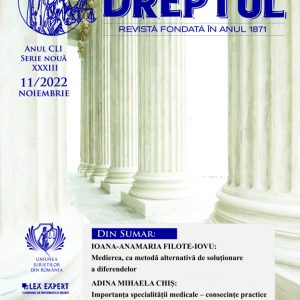
-
 This paper appears as a response to the debate created by the new proposals to amend the criminal codes. I believe that a legal debate should start from the fundamental principles of law and be conducted academically, presenting legal arguments and also knowing the comparative law issues related to the topic debated. This is why this paper offers a historical, current and comparative perspective in terms of recognizing the right to silence to the person being heard as a witness in the criminal trial.
This paper appears as a response to the debate created by the new proposals to amend the criminal codes. I believe that a legal debate should start from the fundamental principles of law and be conducted academically, presenting legal arguments and also knowing the comparative law issues related to the topic debated. This is why this paper offers a historical, current and comparative perspective in terms of recognizing the right to silence to the person being heard as a witness in the criminal trial. -

-
 Dreptul de trecere, reglementat de art. 616–619 din vechiul C.civ., trebuie înțeles sub trei ipostaze: aceea a dreptului de a cere recunoașterea servituții de trecere, ipostaza exercitării servituții legale de trecere și ipostaza dreptului de a cere modificarea servituții legale de trecere. Legat de dreptul de a cere recunoașterea servituții de trecere, acesta este considerat ca având un caracter potestativ, constituind o simplă facultate pentru proprietarul locului înfundat. Prin urmare, atunci când un imobil devine loc înfundat, proprietarul său poate reclama, prin manifestarea sa unilaterală de voință, să îi fie stabilită o servitute legală de trecere. Caracterul potestativ al dreptului rezultă cu claritate din formularea „poate reclama” din art. 616 din vechiul C.civ. (Curtea de Apel Craiova, Secția civilă, Decizia nr. 739 din 9 iulie 2019, www.rolii.ro)
Dreptul de trecere, reglementat de art. 616–619 din vechiul C.civ., trebuie înțeles sub trei ipostaze: aceea a dreptului de a cere recunoașterea servituții de trecere, ipostaza exercitării servituții legale de trecere și ipostaza dreptului de a cere modificarea servituții legale de trecere. Legat de dreptul de a cere recunoașterea servituții de trecere, acesta este considerat ca având un caracter potestativ, constituind o simplă facultate pentru proprietarul locului înfundat. Prin urmare, atunci când un imobil devine loc înfundat, proprietarul său poate reclama, prin manifestarea sa unilaterală de voință, să îi fie stabilită o servitute legală de trecere. Caracterul potestativ al dreptului rezultă cu claritate din formularea „poate reclama” din art. 616 din vechiul C.civ. (Curtea de Apel Craiova, Secția civilă, Decizia nr. 739 din 9 iulie 2019, www.rolii.ro) -
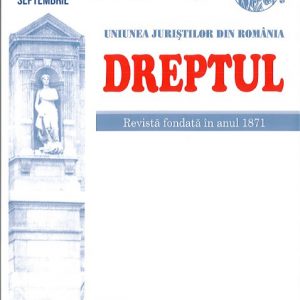 To say that man is the supreme value of a democratic society and of the state of law is a partly true statement. This is because it is known that, in the long period in which the principles of the constitutional democracy and of the state of law have been affirmed in the social practice, no human society succeeded in fully providing the individual with the full extent of its political, social, economic, cultural or religious value. Even in the states considered, without reservations, to be democratic there have been and still are threats to the physical and mental integrity of the individual from some state authorities and even indifference for the individual’s life. In fact, this actually explains that the constitutional utterances according to which „the right to life is guaranteed”, „the dignity and the personality of the individual are supreme values”. The existence of a rule of law and, more so, of a rule of constitutional rank, which affirms and enshrines in normative models the importance of man as supreme value of a socio-political community, proves that the compliance with this value still remains a standard, a requirement imposed on everybody as model of social behaviour.
To say that man is the supreme value of a democratic society and of the state of law is a partly true statement. This is because it is known that, in the long period in which the principles of the constitutional democracy and of the state of law have been affirmed in the social practice, no human society succeeded in fully providing the individual with the full extent of its political, social, economic, cultural or religious value. Even in the states considered, without reservations, to be democratic there have been and still are threats to the physical and mental integrity of the individual from some state authorities and even indifference for the individual’s life. In fact, this actually explains that the constitutional utterances according to which „the right to life is guaranteed”, „the dignity and the personality of the individual are supreme values”. The existence of a rule of law and, more so, of a rule of constitutional rank, which affirms and enshrines in normative models the importance of man as supreme value of a socio-political community, proves that the compliance with this value still remains a standard, a requirement imposed on everybody as model of social behaviour. -
 In this study, the author makes an analysis on the right to life, with emphasis on the moment when the right to life begins to flow, including from the phase of conception of human life, by reference to the case law of the European Court of Human Rights and of other courts outside the European Union, following that, in the final part of the study, an analysis be made on the current criminal provisions protecting the right to life in its incipient phase and the compliance of these provisions with the standard required by the Convention.
In this study, the author makes an analysis on the right to life, with emphasis on the moment when the right to life begins to flow, including from the phase of conception of human life, by reference to the case law of the European Court of Human Rights and of other courts outside the European Union, following that, in the final part of the study, an analysis be made on the current criminal provisions protecting the right to life in its incipient phase and the compliance of these provisions with the standard required by the Convention. -
 Cauza Societatea Profesională Notarială „Etica” împotriva României, Cererea nr. 43190/10, Curtea Europeană a Drepturilor Omului (Secția a patra), Hotărârea din 24 iulie 20181 . La originea cauzei se află cererea din 17 iunie 2010 formulată de Societatea Profesională Notarială „Etica”, persoană juridică română, contra României, în temeiul art. 34 din Convenția pentru apărarea drepturilor omului și a libertăților fundamentale („Convenția”).
Cauza Societatea Profesională Notarială „Etica” împotriva României, Cererea nr. 43190/10, Curtea Europeană a Drepturilor Omului (Secția a patra), Hotărârea din 24 iulie 20181 . La originea cauzei se află cererea din 17 iunie 2010 formulată de Societatea Profesională Notarială „Etica”, persoană juridică română, contra României, în temeiul art. 34 din Convenția pentru apărarea drepturilor omului și a libertăților fundamentale („Convenția”). -
 Cauza Roman Zakharov contra Rusiei, Cererea n° 47143/06, Hotărârea Marii Camere din 4 decembrie 20151
Cauza Roman Zakharov contra Rusiei, Cererea n° 47143/06, Hotărârea Marii Camere din 4 decembrie 20151 -
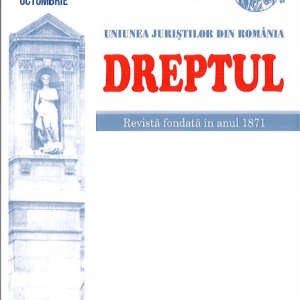 This study represents, in its essence, a micro-monograph regarding the right to image, a component of personality rights. In this respect, following a presentation regarding the “personality rights, in general”, the authors examine in detail the issue of the right to image (notion, basis, autonomy of the right to image, consent to the reproduction of one’s image, limits of the right to image, image contract, extinguishment of the right over image).
This study represents, in its essence, a micro-monograph regarding the right to image, a component of personality rights. In this respect, following a presentation regarding the “personality rights, in general”, the authors examine in detail the issue of the right to image (notion, basis, autonomy of the right to image, consent to the reproduction of one’s image, limits of the right to image, image contract, extinguishment of the right over image). -
 This paper is the first part of a more extensive commentary on Article 5 of the European Convention on Human Rights, which will be entirely published in three consecutive issues of this law journal. The present work assesses the general features of the right to liberty and security as they emerge from the relevant case-law of the European Court on Human Rights. On this occasion, it underlines the purpose of this right, namely the protection of the individual from arbitrariness, and it analyses the general conditions for deprivation of liberty. It also goes on to evaluate the first two such situations of authorised deprivation of liberty enshrined in Article 5 § 1 a) and b) of the Convention.
This paper is the first part of a more extensive commentary on Article 5 of the European Convention on Human Rights, which will be entirely published in three consecutive issues of this law journal. The present work assesses the general features of the right to liberty and security as they emerge from the relevant case-law of the European Court on Human Rights. On this occasion, it underlines the purpose of this right, namely the protection of the individual from arbitrariness, and it analyses the general conditions for deprivation of liberty. It also goes on to evaluate the first two such situations of authorised deprivation of liberty enshrined in Article 5 § 1 a) and b) of the Convention. -
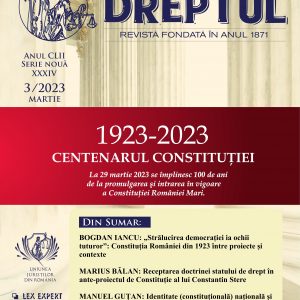
-

-
 Cauza nr. 2205/16, Keskin c. Olandei. Hotărârea din data de 19 ianuarie 2021 Cauza privește imposibilitatea reclamantului de a interoga, în calitate de acuzat într-un dosar privind infracțiunea de înșelăciune, martorii ale căror declarații, consemnate într-un raport al poliției, au fost utilizate ca probe pentru condamnarea sa.
Cauza nr. 2205/16, Keskin c. Olandei. Hotărârea din data de 19 ianuarie 2021 Cauza privește imposibilitatea reclamantului de a interoga, în calitate de acuzat într-un dosar privind infracțiunea de înșelăciune, martorii ale căror declarații, consemnate într-un raport al poliției, au fost utilizate ca probe pentru condamnarea sa.
